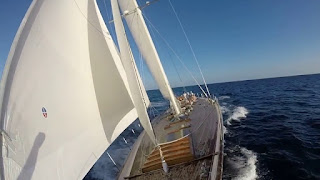A Calm Head
A Calm Head can help you get ahead.
We all get the opportunity to watch a lot of sporting
events. Whilst not one to sit for hours in front of a screen watching games, I
do enjoy watching team sports when the scores or result is up for grabs.
Regardless of the sport, a few things are almost guaranteed. The team that
retains its composure and adheres to its structures will almost certainly
prevail.
Sailing is very much in this category. If you find yourself
under pressure coming up to a finish, a mark, a start-line or just a cluster of
boats, you begin to lapse into negative talk to yourself and as a group. Whether
a single hander or a maxi.
“Not again”
“This always happens”
“What if I make a mistake, it will be my fault, and I will
let everyone down”
“They (the other boat(s) are better than us”
Pressure adds aggravation, the after guard want a quick
solution and put unrealistic expectations on others. This is highlighted a lot
in larger crews but not just for them, I have lost count of the number of two
crew boats where I have had to ask the skipper to stop bullying and the crew to
stop being so sensitive. It always seems that the angst seems to be all one
way. I can’t recall ever having to counsel a helmsperson because that nasty foredeck
is being mean to them!
Understanding
pressure
What is pressure? Actually pressure is a good thing, a few
nerves will help. Pressure can enhance motivation, concentration and enjoyment
when you control it. If it controls you it becomes a negative. The best thing
you can understand is that the pressure you feel does not exist outside yourself.
You create it so you have to control it, don’t let it overwhelm you and make
you anxious. That person ranting and raving back there in fantasy land is not
coping with the circumstances and letting it get to him. Just treat it as
another noise and filter the information as there may be something that may
help amongst the expletives.
What to do
Moving away from all the new age touchy feely stuff. What is
the answer to coping with pressure situations? The answer is the same as needed
by all our yachting maladies, go training! Familiarity through repetition with
any action is the key to mastering it. We are not doing anything we haven’t
done numerous times before, so let’s just do it as we always have. To perform in a race we need to train as we
race. We can’t sail any better than we have trained! It is not possible. That
is our default setting.
Set up of the crew roles is so important, I often see people
go out for a sail intending to train and it is just higgedly piggly with
everyone doing a bit of this and that. You need to do it exactly as you would
like it done in a race. Remember you are often training solo and then racing
will be in a fleet. So you need to be ready as you would need to be in a race.
You can’t wait for another 30 secs to get the brace over the pole end or wait
to sort out the jib sheets so you are clear to tack. In a race that could be
catastrophic. You have to be ready to go at any time. A common mistake on boats
training with fewer crew numbers is the helm helping out on various manoeuvres,
will they be able to do this when racing and surrounded by other boats yelling
for mark room? Possibly not. The more you take this approach the better you as
a sailor and as a crew will be able to handle pressure situations.
Learning to deal with
pressure
There are so many interactive tools online these days to
help us better ourselves. Sailing is the same. Look at some of the high level
sailboat racing, the techniques are there to be studied. But also look at the
crews and the way they work and interact when things are happening. A
“well-oiled machine” is the phrase that seems most applicable. All the
manoeuvres are smooth, focused and obviously well drilled. The most viral
examples are when things go wrong, even when voices get raised due to the
immediacy of action required, the crew work through issues prioritising and
delegating. It is a long way from the Saturday afternoon bawling out we often
encounter at lower levels. The professionalism of the sailors comes through. Although most of us will never be able to
achieve this level of our sport, we can still learn a lot and become better
sailors by emulating the best. These sailors have worked so hard to get to a
level where they have no doubt in their ability. A perfect example of “don’t
just practise until you get it right, practise until you can’t get it wrong.”
So a level head will help us become better sailors. It can
be hard to maintain if we perceive any misfortune as insurmountable and let it
get to us. Concentrate on being calm and focussed, in every sporting event
there are times when we will come under pressure. How we deal with these
moments will go a long way to influencing our results, at any level.




Comments
Post a Comment